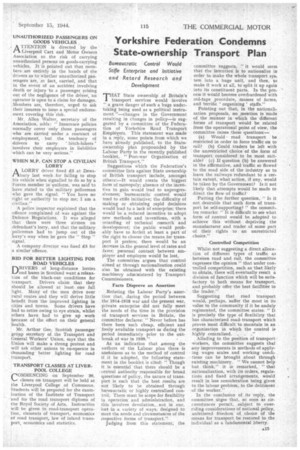Yorkshire Federation Condemns State-ownership Transport Plan
Page 17

If you've noticed an error in this article please click here to report it so we can fix it.
Bureaucratic Control Would Stifle Enterprise and Initiative anti Retard Research and Development THAT State ownership of Britain's 1 transport services would involve " a grave danger of such a huge undertaking being used as a political instrument "—changes in the Government resulting in changes in policy—is suggested by a committee of the Federation of Yorkshire Road Transport Employers. This statement was made in a reply, some points from which we have already published, to the Stateownership plan propounded by the Labour Party in the recently published booklet, " Post-war Organization of British Transport."
Suggestions which the Federation's committee lists against State ownership of British transport include, amongst others:—It would create the biggest form of monopoly; absence of the incentive to gain would lead to unprogressiveness; bureaucratic control would tend to stifle initiative; the difficulty of making or obtaining rapid decisions would lead to a lack of enterprise; there would be a reduced incentive to adopt new methods and inventions, with a retarding of technical research and development; the public would probably have to forfeit at least a part of the right to choose the means for transport it prefers; there would be an increase in_the general level of rates and fares; personal contact between employer and employee would be lost.
The committee argues that control aimed at through nationalization could also be obtained with the existing machinery administered by Transport Commissioners.
Facts Disprove an Assertion Refutiug the Labour Party's assertion that, during the period between the 1914-1918 war and the present war, private enterprise did not fully meet the needs of the time in the provision of transport services in Britain, the committee declares: " Never before has there been such cheap, efficient and freely available transport as during the period immediately prior to the outbreak of war in 1939."
As an indication that among the authors of the Labour plan there is uneasiness as to the method of control if it be adopted, the following statement in the booklet is cited: " Though it is essential that there should be a central authority responsible for broad questions of policy, the nature of transport is such that the best results are not likely to be obtained through bureaucratic or highly centralized control. There must be scope for flexibility in operation and administration, and this involves devolution,. not in one, but in a variety of ways, designed to meet the needs and circumstances of the respective forms of transport."
Judging from this statement, the
committee suggests, " it would seem that the intention is to nationalize in order to make the whole transport system into a huge unit, and then, to make it work at all, to split it up again into its constituent parts. In the process it would become overburdened with red-tape procedure, masses of forms, and terrific ' organizing ' stalls."
Pointing out that, in the nationalization proposals, no mention is made of the manner in which the different forms of transport would be related from the operational point of view, the committee raises these questions:—
(a) aVould road transport be restricted in order to force traffic on to rail? (b) Could traders be left with the unrestricted choice of the form of transport considered to be most suitable? (c) If question (b) be answered in the affirmative, and traffic so flowed to the road side of the industry as to leave the railways redundant to a certain extent, what action, if any, would be taken by the Government? Is it not likely that attempts would be made to direct the flow of traffic?
Putting the further question, '' Is it not desirable that each form of transport be self-supporting? " the committee remarks: " It is difficult to see what form of control would be adopted to achieve this without depriving the manufacturer and trader of some part of their rights to an unrestricted choice."
Controlled Competition Whilst not suggesting a direct allocation of different types of traffic as between road and rail, the committee expresses the opinion " that under controlled competition, such as that likely to obtain, there will eventually result a division of function which will be satisfactory to both means for transport, and probably offer the best facilities to the trader."
Suggesting that road transport would, perhaps, suffer the most in its value to the community if it be unduly regimented, the committee states: " It is precisely the type of flexibility that has characterized road. transport which proves most difficult to maintain in an organization in which the control is highly centralized. . ."
Alluding to the position of transport workers, the committee suggests that any improvements in methods of applying wages scales and working conditions can be brought about through existing machinery. "We cannot help but think," it is remarked, " that nationalization, with its orders, regulations and fixed arrangements, would result in less consideration being given to the labour problem, to the detriment of the worker."
In the conclusion of its reply, the committee Urges that, so soon as circumstances permit, subject to overriding considerations of national policy, unfettered freedom of choice of the means for transport be restored to the individual as a fundamental liberty.




















































